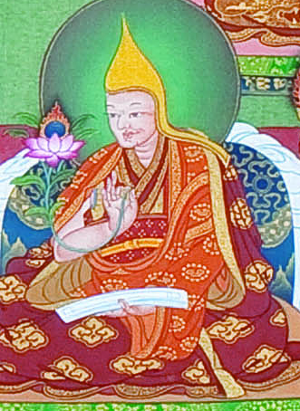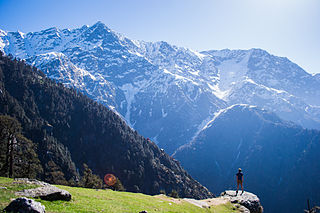
The Central Tibetan Administration is a non-profit political organization based in Dharamshala, India. Its organization is modeled after an elective parliamentary government, composed of a judiciary branch, a legislative branch, and an executive branch, and is sometimes labelled as a government in exile for Tibet.

Gedun Drupa was considered posthumously to have been the 1st Dalai Lama.

Namgyal Monastery is currently located in Mcleod Ganj, Dharamsala, India. It is the personal monastery of the 14th Dalai Lama. Another name for this temple-complex is Namgyal Tantric College.
Miss Tibet is an annual beauty pageant held in McLeod Ganj, India. It is produced by Lobsang Wangyal Productions.

Tibetan Children's Villages or TCV is an integrated community in exile for the care and education of orphans, destitutes and refugee children from Tibet. It is a registered, nonprofit charitable organization with its main facility based at Dharamsala in Himachal Pradesh, North India. TCV has a network spread across India with over 12,000 children under its care.

Jetsun Pema is the sister of the 14th Dalai Lama. For 42 years she was the President of the Tibetan Children's Villages (TCV) school system for Tibetan refugee students.

Jamyang Norbu is a Tibetan political activist and writer, currently living in the United States, having previously lived for over 40 years as a Tibetan exile in India.

The Tibetan Institute of Performing Arts (TIPA) was founded by Tenzin Gyatso, the 14th Dalai Lama on reaching McLeod Ganj, Himachal Pradesh, India in exile from Tibet in August 1959. It was then called Tibetan Music, Dance and Drama Society, which was one of the first institutes set up by the Dalai Lama, and was established to preserve Tibetan artistic heritage, especially opera, dance, and music.

Tempa Tsering.

McLeod Ganj or McLeodganj is a suburb of Dharamshala in Kangra district, Himachal Pradesh, India. It is known as "Little Lhasa" or "Dhasa" as the Tibetan government-in-exile is headquartered here and there is a significant population of Tibetans in the region.

Lobsang Wangyal is a writer, social activist, photojournalist, and events producer, based in McLeod Ganj, Dharamshala, India. He has been a stringer reporter and photographer for Agence France-Presse for many years.

Tenzing Sonam is a Tibetan film director, writer and essayist based in Dharamshala. He works through his production company, White Crane Films, which he runs with his partner, Ritu Sarin.

Tashi Tsering also called Tashi Tsering Josayma; born in 1960, is a Tibetan tibetologist, historian and writer.

Chamdowa Tsawabomei Shangri Lhagyal (1921–1984) was a Tibetan resistance fighter against Chinese occupying forces in 1958–59. He was one of the commanders of the Chushi Gangdruk guerrillas, and fled to India in April 1959 shortly after the arrival there of the 14th Dalai Lama.

Yeshi Dhonden was a Tibetan doctor of traditional Tibetan medicine, and served the 14th Dalai Lama from 1961 to 1980. In 2018, the Indian government honoured him with the Padma Shri, the fourth highest civilian award in India.

Tsering Wangyal simply known as "Editor", was the editor of the Tibetan Review for 20 years.
Tibetan Review is a Tibetan monthly journal and news website published in English, based in Delhi, India. It was first published in Darjeeling, West Bengal in April 1967 by Lodi Gyari. It is well known for its open and vibrant democratic forum for the discussion of the Tibetan problem and other related governmental and social issues on Tibet.

The Amnye Machen Institute is based in Dharamshala working in the field of Tibetan studies. It began along liberal and humanist lines, focusing primarily on secular subjects with emphasis on the contemporary and the neglected aspects of Tibetan culture and history.

Thubten Samphel was a Tibetan writer, journalist, and government official. He worked as a secretary in the Ministry of Foreign Affairs and was a spokesperson of the Central Tibetan Administration, based in Dharamshala. He also worked for the administration's think tank, Tibet Policy Institute.

















